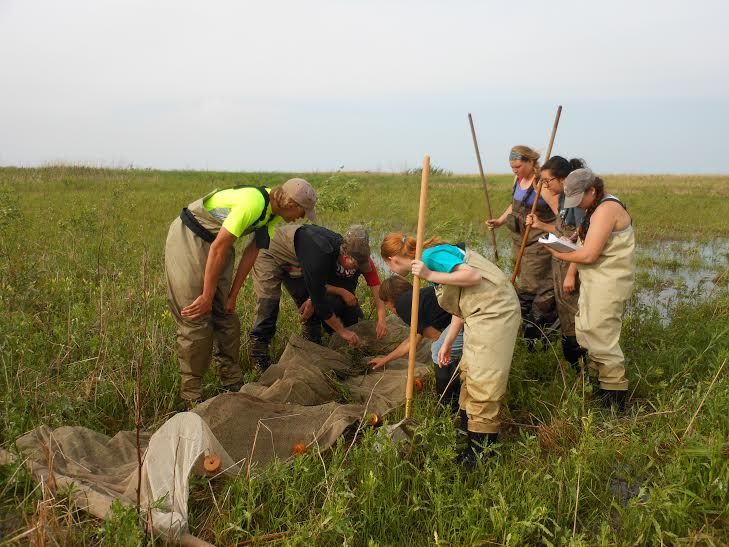Quick class credit available at Iowa Lakeside Laboratory
Lakeside Labs in Okoboji in northwest Iowa.
March 10, 2015
Many students like the idea of taking a few summer courses to lighten the academic load during the spring and fall, but committing a significant amount of time out of the Summer Break can be a deterrent.
The Iowa Lakeside Laboratory — casually known as Lakeside Labs — allows students to avoid this dilemma, making it possible to get 300 level class credit in as little as a week.
Owned by the state and operated through the Board of Regents, the 147-acre Lakeside Lab campus is located on the shore of West Lake Okoboji in Dickinson County, and operates under the motto of “the study of nature, in nature.”
The lab itself is historic. Established in 1909, it now houses an expansive diatom collection. The campus includes multiple buildings constructed by the Civilian Conservation Corps.
Part of the lab’s stated mission is to offer research and credit opportunities to students of all colleges and universities in Iowa. Professors and scientists from varied universities and around the state come to the lab every summer to teach classes that may not be available on every campus.
Registration is now open for the 20 classes being offered this year, which range in duration from one to four weeks. Students can study anything from scientific writing to fire ecology to ichthyology [the study of fish].
“Most of these courses are applicable to degree programs as electives in any environmental-based science or biology majors,” said Steve Hendrix, director of academics and research. “Because of the immersion style [of class] that we use, we can offer one semester hour of credit for every week of class.”
This immersion style means that students live on the lab’s campus and take only one course at a time, with classes from 8 a.m. to 5 p.m. every weekday during the course.
“It’s a sort of cram or crash course,” said Kathleen Delate, ISU professor of horticulture, who will be teaching a two-week course on agro-ecology at the Lakeside Laboratory this summer. “But on the other hand, [students] get so much more time in the field and hands-on experience because these [classes] are small and during the summer.”
Hendrix also believes that small class sizes contribute to the special benefits for students at Lakeside.
“What you get when you come to Lakeside Lab is a unique learning experience that cannot be duplicated on campuses,” Hendrix said. “One of the key factors is that all our classes are small. We are limited by how many students we can get into a large van.”
Promotional materials note that the Lakeside Lab campus offers students a variety of environments to study, including woodlands, prairies and freshwater ecosystems. This allows the laboratory to offer classes studying all types of organisms, from diatoms to prairie grass to birds and fish.
“There’s a dense concentration of many diverse kinds of habitats,” said Jane Shuttleworth, education coordinator in the lab’s promotional video. “It’s the perfect place to teach about nature using the outdoors as a classroom.”
Hendrix said that the concept of “outdoor classrooms” provides special opportunities to students studying live organisms.
“Those are some of the immediate benefits you get by taking a course,” Hendrix said. “You learn about organisms and you get to handle them, you get to study them in their natural habitats, you get to learn how to study them, how to ask scientific questions, et cetera.”
He also believes that taking classes at Lakeside affords students long-term benefits and networking opportunities.
“Because you have small classes … the faculty get to know students very, very well,” Hendrix said. “That translates into the kinds of letters of recommendation that allow you to rapidly develop careers, whether you’re going into a job or going to a graduate program.”
He added that some professors at Lakeside have more than 25 years of experience and still regularly email back and forth with past students from their Lakeside Labs classes.
Hendrix said that although a variety of classes are currently being offered, the laboratory always has its “ear to the ground,” looking for new professors and interesting coursework for students.
“We’re doing some traditional classes — sometimes that we’ve done for as much as 50 years,” he said. “Classes that maybe are traditional but don’t get offered too often, to some very new classes. For example, we have arts kinds of classes too that we’re working on, including a scientific writing program.”
Hendrix also noted that the location of the campus facilitates fun extra-curricular activities for students.
“There’s no shortage of recreational opportunities at the lab,” he said. “We have bicycles so students can just pick a bicycle up and go for a bike ride. We have hiking trails, we have a volleyball court, we have canoes, we have kayaks, we have a paddle board, we have a windsurfer, we have a slack line now — it’s fun to watch people try to get across that — we even have a nice little fire circle where students can hang out in the evenings.”
To register for a class, students can visit the Iowa Lakeside Laboratory website, http://www.continuetolearn.uiowa.edu/lakesidelab/, create an account and fully register online.
Several scholarships are available to assist with the cost of classes, including some of the 50 annual room and board scholarships available to students with a GPA of 3.0 or better, not all of which were claimed as of last Tuesday.
The University of Iowa acts as the administrative body of the Lakeside Laboratory, and thus, course numbers are listed in thousands instead of hundreds, but the 3000-level listings are considered junior- and senior-level classes, Hendrix said.
According to the laboratory website, grades for Lakeside Lab classes are determined both by traditional testing and field participation. These grades are processed by laboratory staff, who then transfer the grades to students’ universities at the end of the course.

















